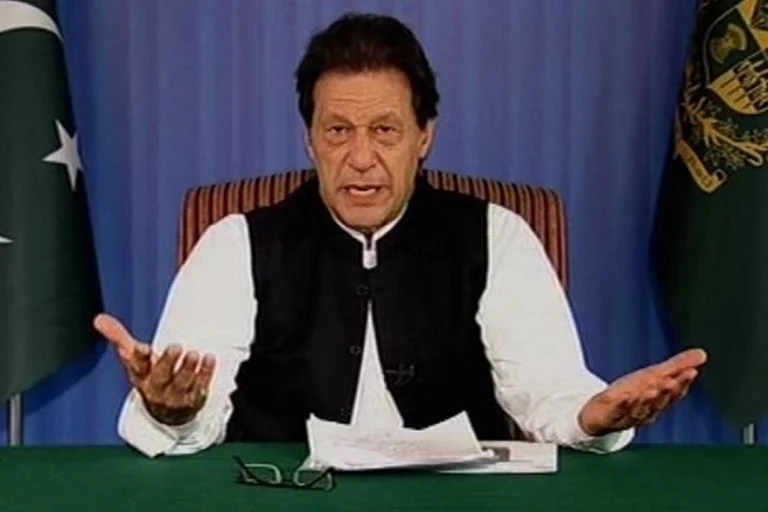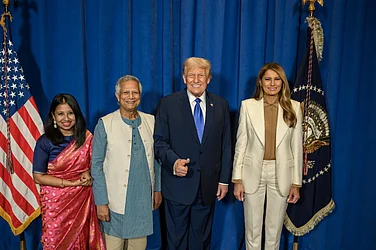Pakistan’s former Prime Minister and cricketer Imran Khan has been sentenced to 14 years in prison for the illegal sale of state gifts, a day after receiving a 10-year jail sentence for revealing state secrets. The decision comes a week before the country votes for its next Prime Minister.
The incarcerated politician was being touted as the leading candidate in the run for Prime Minister position. However, in addition to the prison sentence, the court barred Khan and his wife Bushra Bibi from holding any political office for the next 10 years.
Imran Khan’s exit from the PM race is expected to favour his opponent Nawaz Sharif in the upcoming general elections, notably as the lifetime ban on Sharif was lifted earlier this month.
In 2018, the three-time Prime Minister Nawaz Sharif did not contest elections because he was in prison, serving a 10-year sentence on corruption charges.
Nawaz Sharif was in a self-imposed exile in UK, where he had gone in 2019 for "medical treatment" and had since remained there. He returned to Pakistan in October last year declaring he was ready for the general elections. The conviction against him has now been overturned and the 74-year-old politician will be seen as the leading candidate for the upcoming elections.
Who is Imran Khan?
Born into an affluent Pashtun family in Lahore, the 71-year-old first rose to popularity as a cricketer. Imran Khan, an exceptional bowler and all rounder, achieved a significant milestone as the first and only Pakistani captain to lead his team to victory in the World Cup in 1992.
In addition to his cricketing success, Khan also became known as a philanthropist through numerous acts of charity. He served as the chief fundraiser for the Shaukat Khanum Memorial Cancer Hospital, a specialised facility in Lahore established in 1994 and named after his mother, who died of cancer in 1985.
Imran Khan’s political ascent
Following his retirement from cricket, Khan emerged as an outspoken critic of government mismanagement and corruption in Pakistan. His focus shifted towards politics and governance, leading to the formation of his own party, Pakistan Tehreek-e-Insaf, in 1996.
Imran Khan’s political agendas of anti-corruption, economic growth and social welfare were well-received by the masses and over the years Imran Khan found considerable backing especially from young people.
In the months preceding the legislative elections set for early 2013, Khan and his party garnered substantial crowds at rallies and secured the backing of various seasoned politicians from Pakistan’s established parties.
More proof that Khan was becoming more influential in politics came from a survey in 2012 which revealed that he was seen as the most liked and supported political figure in Pakistan.
Even though PTI got the most seats it ever had, it wasn't enough to have the majority. Nawaz Sharif became the Prime Minister, and Khan claimed that the Pakistan Muslim League-Nawaz (PML-N) cheated in the elections. When their demands went unheard, he and other opposition leaders organised four months of protests in late 2014 to oust Sharif.
In 2018, Imran Khan became PM for the first time securing 176 votes while his opponent Shehbaz Sharif got 96. “We will run Pakistan like it’s never been run before,” Khan had said in his victory speech.
In Pakistan, the military wields substantial influence in governing the nation. It is believed that when Imran Khan became the Prime Minister, he had a positive relationship with the military generals. However, over time, the relationship soured.
Imran Khan as PM
According to those within his government, the military “called the shots” during Khan’s first few years in power, The Guardian reported.
However, by 2021, the dynamics of this relationship began to shift. An increasingly assertive Khan started to resent the military's control, openly expressing resistance and accusing the military of "blackmailing" his government. Concurrently, the military expressed discontent with Pakistan's declining economic situation. As they quietly withdrew their support, Khan's government visibly weakened in the public eye.
In April 2022, the government led by Imran Khan was dissolved after a successful no-confidence motion. The motion, needing 172 votes in the 342-seat parliament to pass, garnered support from 174 politicians.
Cases against Imran Khan
The cricketer-turned-politician was arrested in August of last year and handed a three-year sentence in a corruption case.
Imran Khan currently has about 150 cases pending against him which he denies, accusing the military of wrongdoing. Khan has been handed a 10 year sentence for allegedly making public a classified cable sent to Islamabad by Pakistan's ambassador in Washington in 2022, in what is commonly known as the Cipher case.
Khan has also been sentenced for 14 years for not disclosing certain gifts to the Toshakhana and for irregularities in the sale of certain gifts deposited in Toshakhana.
Imran Khan has been fined PKR 787 Million and also been banned from holding political office for the next ten years.
Imran Khan finds himself in a similar situation as Nawaz Sharif was until a few days ago. Pakistan’s Supreme Court on January 18 scrapped a lifetime ban on politicians with convictions from contesting elections, paving the way for former Prime Minister Nawaz Sharif to run for the fourth time. The lifetime ban on convicted politicians was imposed in 2018, Associated Press reported.


























